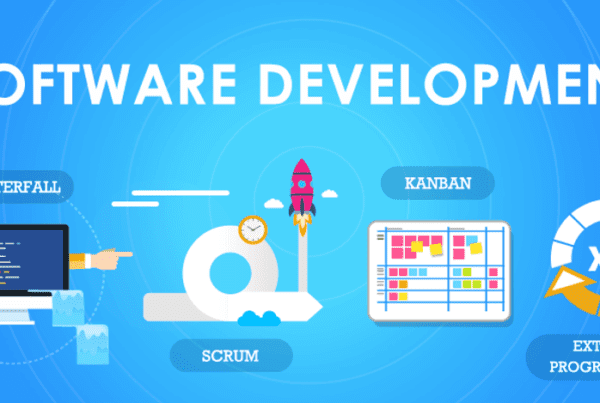#1 Master marketing and sales
A developer with marketing skills can create products and earn an income well above his skills as a programmer in the strict sense. Let’s say that only 20% to 40% of the success of a software company depends directly on the activity of developing software. A software developer with excellent code and complete software but no clients is just a software developer, not a business or a company. An entrepreneur with many potential clients but no software/product is on the market.
Your brand, reputation, and intellectual property are 100 times more valuable than any software or technical feat. The software and technical work are relatively cheap and replicable. They cannot be the foundation of your business because someone can come and clone your product after you have done the hard work of introducing an innovative product and establishing/educating the market. If another product has only half the functionality of yours, but more effective marketing is more than enough to make it more successful than you.
#2 Understand your customers
Most companies fail because they build something that nobody wants.
Know well who you are selling to and what problem you are solving for them before developing something. Forget the code, find the market first. Talk to your clients. Ideally, you should try to solve with software your own problem that is recurrent in the market, or in other words, a software that solves a problem of which you are the target market along with many others. If you are not the target audience for the product you are going to create, you need to find and hire a product manager who does know in depth the problem you want to solve before creating the MVP (minimum viable product).
#3 Don’t be seduced by technology (Software)
Sometimes developers don’t realize that the hardest parts of starting and growing a business have nothing to do with the code or technology stack that is chosen. Marketing and Sales, getting and retaining customers, and everything else in between is much more difficult to sustain in the medium term than writing code.
Customers don’t care that your new technology is shiny and fresh, they care that it solves their problem. Often many developer-entrepreneurs will argue that it is much easier to do it with old and proven technology (there are many cases in the market of obsolete technologies that are still used for new developments) because new technologies change rapidly, they are less stable, it has fewer learning resources and fewer developers.
The important thing here is to focus on being differential and offering competitive advantages to your target audience, being as standard as possible in everything else (cloud, multi-platform, multi-device, etc.).
#4 Learn to delegate
Imagine that you write a job application of yourself for each of the jobs the company has to do and carefully consider why the hell you would hire yourself for each job.
The time you dedicate to a task is valuable, the time you dedicate to it is time that you cannot dedicate to anything else. So focus on doing the things that you are best at and that you excel at everyone else.
Determine exactly what tasks there are in managing your business that you are not an expert in, such as accounting, sales, administration, etc … and hire people to do those parts for you.
#5 Set income goals
Plan profitability, set goals and be realistic about whether you are achieving them successfully. If you do not achieve the desired profitability, you may have a good personal project on your hands, but not a viable company.
An objective that is often used in the software industry as a guideline to know if a company is going to be profitable in the medium term is that a monthly income of € 10,000 is obtained within three months after launch (this is basically limit profitability for a small team of 2 to 4 people, plus a little extra money to reinvest in the company).
If that profitability can be achieved, then either the product, the target market, or the team needs to be reviewed. It’s not a tough goal, but it’s a great way to financially frame your product launch by forcing yourself to ask tough questions about what you’re doing.
It is also useful as a pricing criterion from the beginning. If you have very few clients, they would have to pay enough for you to reach € 10,000 in 90 days. If your product is not worth that much, then you need to expand or improve it. It is better to overcome this pitfall from the beginning. If you feel like you can’t make € 10,000 of monthly recurring income over a three-month period on your own, then you probably need to find a co-founder who can help you get there. Thus, in addition, you can already calibrate the expectations of the co-founder also based on your experience.
#6 Create an MVP
Develop the smallest viable version of your product and test it as soon as possible, make it available to customers as soon as possible, and ask them to pay you.
Often all you need is a landing web page to measure interest. Create a static website describing the problem and the solution, with a record, using Google Adwords and Analytics.
Skip everything that is not essential at first. Focus on the key features that customers will pay for. It will seem incomplete and broken to you, but it is only broken if you can’t get customers. When you find the correct formula for the product and need to scale, you will probably need to refactor or rewrite large parts of the code anyway, but knowing that the product works the job is done differently.
Do things that don’t scale. Don’t test your MVP thinking ahead, just do it so you can validate that your product has a real market beyond your four walls.
#7 Other important tips
- It is important to be good at talking to people and networking.
- A good reputation and word of mouth are better than buying the # 1 spot on Adwords.
- “Fire” bad customers. They are not worth the stress, frustration, and opportunity cost.
- Learn to say “no” to requests that don’t fit.
- Don’t forget to take care of yourself.
- It is a marathon, not a race. Sleep, exercise, eat healthy food.
- Be patient. It will take longer than you think.
- Work on your process. Doing an hour of client work allows you to earn an hour of income. Improving your business processes can earn you a large multiple of that.
- Find out how to sell to the same customers over and over again. The first sale is the hardest, so you can “downgrade” it, and make the most money in the future with that same customer.
- Don’t let a single customer represent more than 10% of your income. If that client leaves, you will be in a dire situation.
- Banks will lend you money when you don’t need it, and they won’t lend you money when you do need it. Apply for a loan or line of credit when you have the cash to have a fund in case things go wrong.
- Don’t hire too fast. Try to get 3 months of payroll in the bank before proceeding to the next hire.
- Create simple products that do one thing well.
- Do not accept money from anyone who cannot afford to invest badly.
- Don’t hire an outside “marketing” company. They will charge to ask you questions like ‘What do you think we should do? If the product ranks well with customers, you know more than the marketing company will ever know.
- Bugs (at least small ones) are not a problem. Not recovering is.
- Start now, you will never feel ready. Just start, learn, and repeat. Action is king.










Colospa https://pharmacylo.com/ pharmacy intern
legal online pharmacy https://pharmacylo.com/ Detrol
I love this!!!!!!
Definitely not looking to do any work for your next get? Youre in luck. Professional complete assistance movers can handle all typically the careers associated with your shift so that you can rest, relax, and watch your to-do assortment dwindle down without possessing to lift some kind of finger. It is very a great option for people who’d rather not take on the actual massive job of moving or even for many who, for whatever reason, can not handle the tasks with regards to relocating on their own. And while it’s in no way the cheapest solution, the amazing edge provided by means of full service movers is certainly very much always worth it. Below, we will go over what to be expecting from full solutions movers, like what sorts of details they’ll do for you and just how much willing to likely to commit.
What exactly do comprehensive services movers do?
Simply put, full service movers will do every little thing linked to your move. This involves:
Supplying nearly all packing materials and also supplies. Do not require make endless journeys to the shop for cardboard boxes, packing tape, bits of paper, and real estate wrap. Full company movers will supply everything that your transfer requires, including shipping supplies the same as furniture blankets and additional extra padding.
Taking up your belongings. Loading is one of the most difficult and time consuming parts associated with moving, nevertheless it doesn’t have to be able to be. Full service movers are generally movers who pack within your along with trained packers who can get your belongings safely boxed up inside a new fraction of the time it might take you to help build-it-yourself. They’ll also be ready to expertly in addition to securely contain up fragile and valuable goods, such as glass and art work.
Furniture disassembly. Full service movers will make sure all of your large, cumbersome, and/or major furniture makes it female final destination intact. Part of this includes imperfect or full-disassembly involving furniture simply because required (and reassembly when the time period comes).
Vehicle loading and unloading. Leave the actual heavy lifting in the pros. Right after packing up your residence, whole service movers will fat everything safely on to the big rig, which include any appliances that prepared to taking along with you. When you arrive at your fresh residence, they’ll unload the articulated vehicle too.
Transporting your belongings. Regardless of whether they are moving across the street or across the country, finish service movers will drive your belongings there for you. You’ll be provided with often the supply window for when your items will arrive so that almost all you have to focus with has become yourself there to acknowledge the valuables.
Unpacking. Full assistance movers examine just pack way up your home-they may possibly unpack with regard to you, too. While you give attention to other tasks associated with settling inside, your movers will produce sure that anything goes wherever it’s supposed to. An individual provide the guidance, and they’ll handle the task itself.
Disposal associated with recharging materials. A move could allow you to with dozens (or lots! ) of cardboard boxes that need to be recycled, because well as other materials in which need to be properly disposed-from plastic wrap to packing peanuts. Your full service movers may make sure everything gets disposed regarding properly and will completely acquire care of the commotion which you’re left with of course your current belongings are unboxed.
Basically, in the event that it’s part of a get, your full service movers can take care of it for a person. You’ll employ the professional movers that you receive to find out an exact plan seeing that well as precisely what tasks you could like them to look after.
Exactly how much will this all fee?
As you can expect, using the services of a company to complete all connected with the above tasks is going to cost more in comparison to employing a company to do just one or two of them. Our moving cost calculator will let you find out how much you may well spend on a total service shift based on how much you may have and how far you’re transferring. Ultimately, the more assistance a person want or need to have, the far more you’re going to pay, having full service moving companies normally costing about $25-$50 an hour for every single mover. Your final price tag will depend on:
Exactly what number of movers you require
How much products maybe you have
How far the movers will need to journey
Regardless of whether or not you require taking materials (some full service movers including wrapping materials, others get extra fees for them)
Just what tasks typically the movers do with regard to you
The time of calendar year you move (rates are generally increased for the most famous days, times, and seasons to help move, as well as upon holidays)
Once you would do almost any time you’re employing moving expert services, make sure to get estimates from at least three various comprehensive service moving companies thus that you can look at costs and make the most educated selection possible. You can slice costs by taking in the tasks yourself-for instance, having typically the movers pack, load, transport, and market for you but using care of all the unwrapping and material disposal on your current own.
The length of time15411 will a total service move consider?
Packing along with moving yourself often takes days, actually weeks, to accomplish. As well as full service movers, you’ll , the burkha established timetable and a better understanding of how long from start to help finish. This program will contain:
Estimate and planning time period. Throughout order to give you the actual most accurate opinion possible, any full service moving company transmits somebody to your house for you to take a general deliver connected with what’s there. Plan on a short time for this, as you probably won’t are able to geting a same-day appointment for the walkthrough. The walkthrough itself should take about an hour.
Providing and furniture disassembly. Finding a handful of trained packers means that will your own personal belongings get prepared regarding vehicles significantly faster than you could do on your personal. Figure that a three bedroom home will take full provider movers about 2-3 hours in order to completely clean up.
Loading and unloading. Getting something on and down the truck is actually considerable simple tasks full service movers supply. Together, loading and unloading shouldn’t take more than a good hour and even hour and the half.
Unpacking. If you’re helping your movers unpack for you, an individual can devote about the identical amount of time for unpacking as you did for packing.
You will should factor in the period for transport concurrently, which will certainly be based on how significantly your movers have to journey.
How to find a trustworthy full service mover
We help to make it readily available reputable, insured, as well as bonded finish service movers to help hire for your next shift. Simply submit your moving details at moving. com for a pre-vetted list of licensed as well as insured movers who can support your move. You might be getting to have quickly access to the information that will matter, including Better Business Bureau reviews and buyer ratings.
It’s extremely important to communicate with relocating companies directly so that a person can discuss your personal needs and also come up with the finest policy for your upcoming move. Decide on a few or more companies in which look like they could be a great fit and call them up for a discussion about what prepared to looking for plus a general imagine (not a true estimate-that will require a home visit).
Total assistance movers are the yellow metal standard in moving services, as well as well worth the charge in case you have the money in order to spend. If you’re trying to carry out as little work as feasible for your future move, start carrying out your research when full services movers in your area and find a company that offers specifically what you’re trying to find. Selecting the particular best movers for the employment is the most work you’ll have got to placed in your move, which doesn’t look all that undesirable.
If you require more information or request moving rates, you can easily go to this internet site- https://www.flashmoving.net/packers-and-movers/